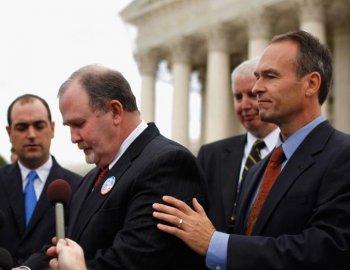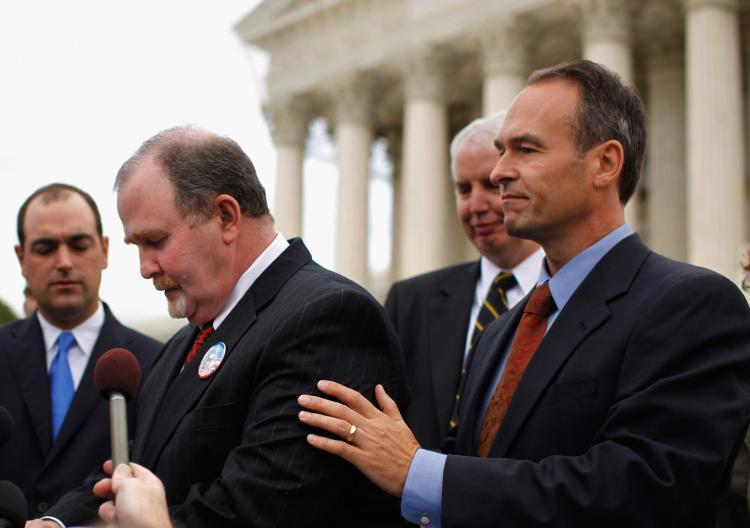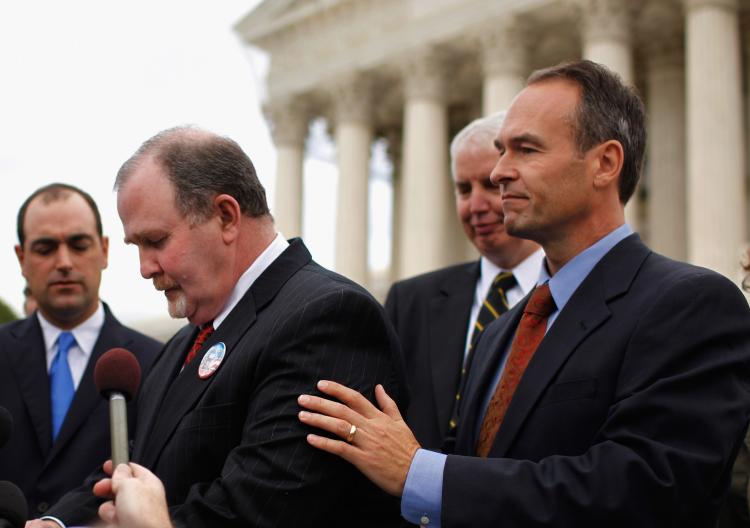The Supreme Court ruled in favor of the Westboro Baptist Church (WBC) on Wednesday, stating that the First Amendment gave them the right to demonstrate at the funeral of a fallen U.S. Marine.
Their demonstrations, intended to shock and draw public attention, were met in court by Albert Snyder, after the Westboro Baptist Church (WBC) praised the death of his son, Matthew, during the funeral.
While demonstrating, the WBC is not permitted to come closer than 1,000 feet to the funerals. According to court documents, Snyder saw the picketers while driving to his son’s funeral but did not learn what was written on their signs until he was watching the news later that night.
The case was taken to the Supreme Court on Oct. 6, 2010, with charges against the WBC, including intentionally causing emotional distress, intruding on seclusion, and civil conspiracy. “A jury held Westboro liable for millions of dollars in compensatory and punitive damages,” states the court document.
The WBC defended their actions saying that their demonstration was aimed at a public issue, and not specifically at Matthew Snyder.
Although the high court’s decision upheld the First Amendment, it was received with disappointment from emotionally torn families and veterans who believe the WBC specifically targeted Snyder.
“Just the fact that someone would knowingly and willingly try to inflict damage on the families of fallen soldiers is just abhorrent to us,” said Mark Seavey, attorney, and New Media manager with The American Legion, the largest veterans service organization in the United States.
Seavey, who attended the court hearing, stated that the decision should have made a stronger distinction on who the WBC was targeting. While many of their signs were about public issues, they also had signs aimed at Snyder.
“While we lost today we’re certainly not going to give up the effort to shield our brothers and sisters in arms from people who would protest against them for what they did in the line of duty,” Seavey said.
In the meantime, Seavey believes that more people will show up at military funerals to counter the WBC’s demonstrations. Two organizations, the Patriot Guard Riders and the Legion Riders, often show up at military funerals on their motorcycles and rev their engines to drown out the WBC.
The WBC could not be reached for comment, as its phone line was seemingly overloaded.
The WBC, based in Topeka, Kansas, was founded by Fred Phelps. Most of its members are part of his own family.
Although the WBC boasts it has demonstrated at the funerals of more than 400 U.S. soldiers over the last 20 years, their demonstrations are not limited to military funerals.
They have targeted everything from Jews to Barack Obama, to singer Justin Bieber. They often appear at high-profile funerals, including that of Fred Rogers, who hosted the children’s show “Mr. Rogers’ Neighborhood.”
While rescue workers were searching for survivors after the 2005 Asian tsunami, the WBC released a press release against missing Swedes, stating, “We sincerely hope and pray that all 20,000 Swedes are dead.” The release then goes into graphic detail of their possible deaths.
The WBC is categorized as an extremist group by the Anti-Defamation League (ADL), a civil rights organization.
According to the ADL, “A primary goal of the WBC is to garner publicity.” It also has a group of attorneys among its ranks who ensure that the group’s activities are protected within the boundaries of free speech allowed by the First Amendment.
“The WBC pushes the envelope and may bait groups to take action against them, which in turn, could result in the group bringing lawsuits against towns that they believe did not offer them adequate protection,” states an ADL document on the WBC.
The ADL stated in a press release, “While we deplore Westboro Baptist Church’s hateful ideology, the Supreme Court’s narrow ruling upholding their free speech rights was an appropriate decision based on the facts of this specific case.”
Their demonstrations, intended to shock and draw public attention, were met in court by Albert Snyder, after the Westboro Baptist Church (WBC) praised the death of his son, Matthew, during the funeral.
While demonstrating, the WBC is not permitted to come closer than 1,000 feet to the funerals. According to court documents, Snyder saw the picketers while driving to his son’s funeral but did not learn what was written on their signs until he was watching the news later that night.
The case was taken to the Supreme Court on Oct. 6, 2010, with charges against the WBC, including intentionally causing emotional distress, intruding on seclusion, and civil conspiracy. “A jury held Westboro liable for millions of dollars in compensatory and punitive damages,” states the court document.
The WBC defended their actions saying that their demonstration was aimed at a public issue, and not specifically at Matthew Snyder.
Although the high court’s decision upheld the First Amendment, it was received with disappointment from emotionally torn families and veterans who believe the WBC specifically targeted Snyder.
“Just the fact that someone would knowingly and willingly try to inflict damage on the families of fallen soldiers is just abhorrent to us,” said Mark Seavey, attorney, and New Media manager with The American Legion, the largest veterans service organization in the United States.
Seavey, who attended the court hearing, stated that the decision should have made a stronger distinction on who the WBC was targeting. While many of their signs were about public issues, they also had signs aimed at Snyder.
“While we lost today we’re certainly not going to give up the effort to shield our brothers and sisters in arms from people who would protest against them for what they did in the line of duty,” Seavey said.
In the meantime, Seavey believes that more people will show up at military funerals to counter the WBC’s demonstrations. Two organizations, the Patriot Guard Riders and the Legion Riders, often show up at military funerals on their motorcycles and rev their engines to drown out the WBC.
The WBC could not be reached for comment, as its phone line was seemingly overloaded.
Extremism
The WBC, based in Topeka, Kansas, was founded by Fred Phelps. Most of its members are part of his own family.
Although the WBC boasts it has demonstrated at the funerals of more than 400 U.S. soldiers over the last 20 years, their demonstrations are not limited to military funerals.
They have targeted everything from Jews to Barack Obama, to singer Justin Bieber. They often appear at high-profile funerals, including that of Fred Rogers, who hosted the children’s show “Mr. Rogers’ Neighborhood.”
While rescue workers were searching for survivors after the 2005 Asian tsunami, the WBC released a press release against missing Swedes, stating, “We sincerely hope and pray that all 20,000 Swedes are dead.” The release then goes into graphic detail of their possible deaths.
The WBC is categorized as an extremist group by the Anti-Defamation League (ADL), a civil rights organization.
According to the ADL, “A primary goal of the WBC is to garner publicity.” It also has a group of attorneys among its ranks who ensure that the group’s activities are protected within the boundaries of free speech allowed by the First Amendment.
“The WBC pushes the envelope and may bait groups to take action against them, which in turn, could result in the group bringing lawsuits against towns that they believe did not offer them adequate protection,” states an ADL document on the WBC.
The ADL stated in a press release, “While we deplore Westboro Baptist Church’s hateful ideology, the Supreme Court’s narrow ruling upholding their free speech rights was an appropriate decision based on the facts of this specific case.”







